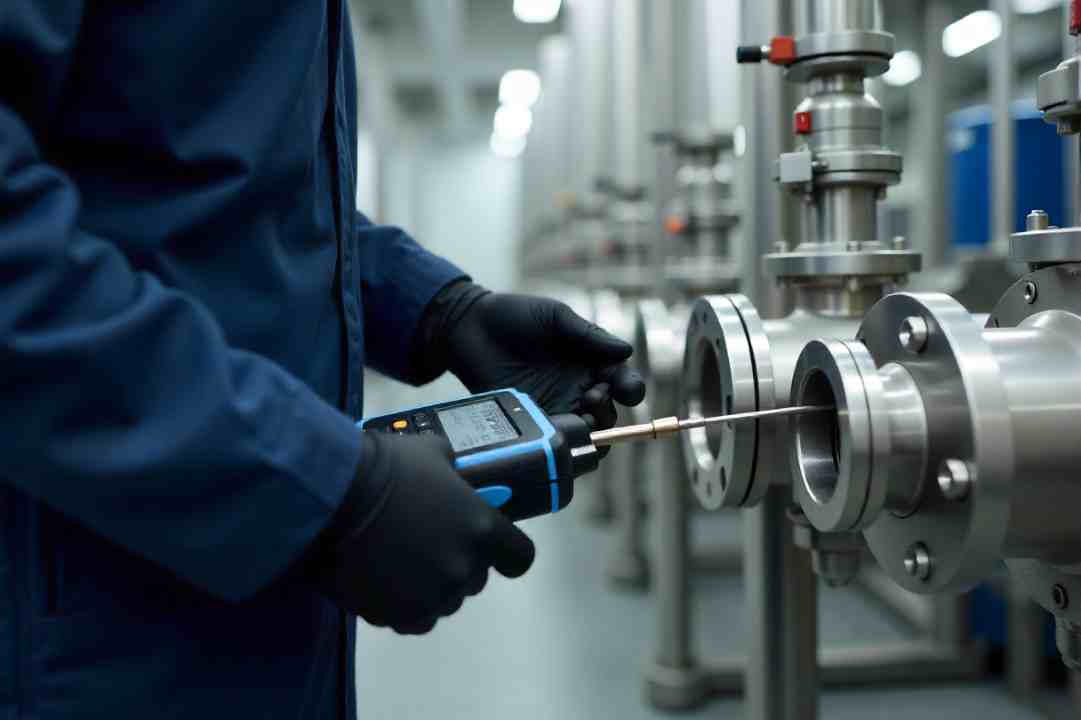In the transition to a more efficient and low-emission industry, LDAR (Leak Detection and Repair) programs have become an indispensable element for industrial facilities, especially in sectors such as oil & gas, chemical, pharmaceutical and advanced manufacturing. But what does an LDAR program really consist of and why is it critical for your plant?
LDAR is a systematic management program for the detection and repair of leaks of volatile organic compounds (VOCs) and hazardous gases in industrial equipment and facilities. Its main objective is to identify early fugitive emissions that may occur in valves, flanges, pumps and other process components, minimizing product losses, reducing emissions and improving plant safety.
What regulations govern LDAR programs?
The implementation of LDAR is not only a good practice, but in many cases a legal requirement.
- In the European Union, Regulation (EU) 2018/2066 establishes specific requirements on the control of fugitive emissions in installations subject to emissions trading systems.
- Regulation (EU) 2023/957, reinforces GHG and methane reduction commitments. OGMP 2.0 regulations for the energy sector.
- Standards such as EN 15446:2008 provide technical guidelines for the measurement of fugitive VOC emissions in installations.
- In other frameworks such as in the USA, EPA regulations (40 CFR Part 60 and Part 63) establish specific requirements for LDAR programs in regulated sectors.
- In addition, with the publication of the EU Methane Regulation, the need for robust leak detection and repair programs is reinforced, driving the transition to more sustainable and emission-transparent operations.
Industries where LDAR is essential
This system is critical in sectors with a high risk of fugitive emissions:
- Oil & Gas: In refineries, storage terminals and platforms.
- Chemical and Petrochemical: Where VOCs are part of key processes.
- Advanced manufacturing: Especially those with thermal, reactive or gas transfer processes.
Benefits of implementing an LDAR program in your plant
- Emission reduction and legal compliance: Helps your plant comply with VOC and methane emission limits, reducing the risk of penalties and regulatory costs.
- Product savings: Identifying and repairing leaks minimizes product losses and improves operational efficiency.
- Safety and risk prevention: Reduces personnel exposure to hazardous substances, reducing the risk of fire, explosion or poisoning.
- Transparency and sustainability: Reinforces the company’s commitment to decarbonization and transparency in environmental matters, aspects that are increasingly valued by investors, administrations and customers.
How do we implement an LDAR program at EHS Techniques?
At EHS Techniques we accompany our clients in all phases of the implementation of an LDAR program:
- Diagnosis and planning adapted to your installation.
- Elaboration of the inventory of leakage points and their prioritization according to criticality.
- Execution of monitoring campaigns with state-of-the-art equipment (FID/OVI) to detect and quantify leaks.
- Generation of clear and action-oriented reports with improvement proposals and optimized remediation plans.
- Training of plant teams to ensure the continuity and effectiveness of the program.
We have experience in refining plants , chemical, pharmaceutical and industrial facilities, with an approach aligned with applicable regulations and industry best practices.
The LDAR program is a key tool for any plant seeking to improve environmental performance, reduce operating costs and ensure legal compliance. At EHS Techniques we help you transform this challenge into an opportunity for improvement and leadership in sustainability within your industry.
If you are evaluating the need to implement an LDAR program at your facility, contact us to discuss how we can help you design a customized plan that will optimize your operations and effectively reduce your environmental footprint.
EHS Techniques is a specialized environmental consultancy created by professionals from different fields and with experience in multinationals in the sector, which was created with the purpose of offering customized services with the most advanced techniques.
Working directly with each client, together with an active commitment to overcome the typical limitations of large consulting firms, such as operational slowness, lack of local adaptation or excessive rigidity, allows us to offer a truly personalized service. We are committed to proximity, flexibility and human treatment, always backed by a solid technical professionalism and quality guarantees.
Company
The EHS Techniques team and its experience guarantee a close and flexible service adapted to our customers and the implementation of the most advanced technologies internationally at reasonable costs.
Contact our team to design your LDAR strategy in the most efficient way and with professionals who will design the optimal roadmap adapted to your needs.
International experience
We have the international experience necessary to continue offering this service anywhere in the world.

 Español
Español
